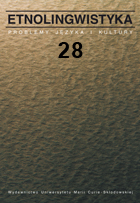Archeologia świadomości językowej Polaków i Rosjan. Analiza porównawcza na materiałach polskiego i rosyjskiego słownika asocjacyjnego
Archeology of linguistic awareness of Poles and Russians. Comparative analysis of Polish and Russian associative dictionaries
Author(s): Roman GawarkiewiczSubject(s): Language and Literature Studies, Applied Linguistics
Published by: Wydawnictwo Naukowe Uniwersytetu Marii Curie-Sklodowskiej
Keywords: linguistic worldview; associative units; core of linguistic awareness; Poland and Russia
Summary/Abstract: The article presents a comparative analysis of selected linguistic material in Polish and Russian associative dictionaries. A detailed description is offered of the core of Polish and Russian linguistic awareness, i.e. with respect to those units that enter into the greatest numbers of connections with other units of a given associative network, presented in the form of a reversed associative dictionary (from reaction to stimulus). The analysis leads to the conclusion that concepts seemingly identified as very close to each other on the semantic plane, functioning in Polish and Russian, are often characterised by significant semantic differences. The differences are especially clear in associative networks of names for emotions, values, and human actions. The young people from Poland and Russia taking part in the study differ significantly in their judgements of what and to what extent they consider good or bad, great or inconspicuous, active or passive. Young Poles have a stronger tendency to view and evaluate the world through the prism of hedonistic values. Their accounts more rarely contain characteristics related to lives of communities (in this context an important position is occupied only by the close ones). The linguistically shaped world of young Russians is different: the central position there is taken by associative networks where the dominant characteristics relate to communities, collective work, and the need for material and financial security.
Journal: Etnolingwistyka. Problemy Języka I Kultury
- Issue Year: 28/2016
- Issue No: 28
- Page Range: 151-167
- Page Count: 17
- Language: Polish

